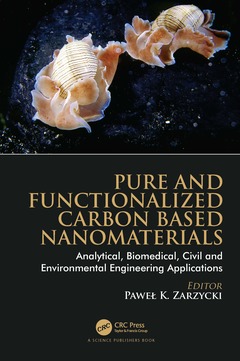Description
Pure and Functionalized Carbon Based Nanomaterials
Analytical, Biomedical, Civil and Environmental Engineering Applications
Coordinator: Zarzycki Pawel K.
Language: English
Subjects for Pure and Functionalized Carbon Based Nanomaterials:
Keywords
Go; Carbon nanocomposites and structures; Carbon Nanomaterials; ullerenes; carbon nanotubes and graphene sensing devices; CNTs; carbon based structures for fractionation; Multi Wall CNTs; Purification target bioanalytes; Magnetic Nanoparticle; Wastewater technological processes; GQDs; environmental remediation; RGO; biofuels production; Graphene Sheets; functionalized carbon nanomaterials; AC; radar adsorbing materials; Energy Density; hybrid nanocomposites; HTC; DLC Film; Carbon Materials; IGC; IGC Experiment; Multiwalled Carbon Nanotubes; MP; HSP; Planar PAHs; BAC; CDs; BAC Process; Coconut Sap; Graphite Oxide; Logarithmic Retention Factor
Publication date: 02-2022
· 17.8x25.4 cm · Paperback
Publication date: 07-2020
· 17.8x25.4 cm · Hardback
Description
/li>Contents
/li>Biography
/li>
This book describes in a comprehensive manner latest studies conducted by various research groups worldwide focusing on carbon and related nanomaterials. Fourteen chapters of this book deal with a number of key research topics and applications of pure and functionalized carbon nanomaterials and their hybrid nanocomposites. Specifically, the authors have presented interdisciplinary investigations including: (i) carbon nanoparticles and layers synthesis, (ii) analytical aspects of carbon nanomaterials and their characterisation under different conditions as well as (iii) various applications of carbon nanoparticles. They have reported and summarised key applications of carbon particles or nanoobjects in pharmacy, biomedicine, agriculture and food industry, water treatment, physicochemical analysis, optoelectronics, electronic and magnetic materials for supercapacitors or radar adsorbing materials, tribology, chromatography, electrophoresis, bioanalysis, nanobiocatalysis, biofuels production as well as environmental remediation.
Nanographenes
Efstathios V. Liakos, Ramonna I. Kosheleva, Athanasios C. Mitropoulos and George Z. Kyzas
Bio Realization of the Synthesis of Diamond-like Carbon Thin Film by Low Cost Electrodeposition Technique
S. Gupta
Synthesis of Coal-based Nanocarbon: Advances and Applications
B. Manoj
Biomass-derived Carbon Compounds and their Potential Application for Electronic and Magnetic Materials
Retno Asih, Malik Anjelh Baqiya, Yoyok Cahyono and Darminto
Bio-based Carbon Materials for Anaerobic Digestion
Kaijun Wang, Yasir Abbas and Sining Yun
Potential Applications of Nanobiocatalysis for Sustainable Biofuels Production
Madan L. Verma, Shivali Sahota and Asim K. Jana
Carbon-based Nanomaterials for Energy Storage and Sensing Applications
Elochukwu Stephen Agudosi, Ezzat Chan Abdullah, Nabisab Mujawar Mubarak and Mohammad Khalid
Carbon Nanomaterials in Biosensors for Biotechnological Applications
Madan L. Verma, Meenu Thakur, Pankaj Kumar, Irfan Ahmad and Krishan D. Sharma
Applications of Carbon Nanotubes-based Electrochemical Sensing Strategies for Heavy Metals and Arsenic Quantification
Marcela C. Rodríguez, M. Dolores Rubianes, Fabiana A. Gutierrez, Marcos Eguílaz, Pablo R. Dalmasso, M. Laura Ramírez, Cecilia S. Tettamanti, Antonella Montemerlo, Pablo Gallay and Gustavo A. Rivas
Carbon Encapsulated Functional Magnetic Nanoparticles for Life Sciences
Clara Marquina and M. Ricardo Ibarra
Chromatographic Techniques for Characterization of Carbons and Carbon Composites
Adam Voelkel and Beata Strzemiecka
Fullerenes and Polycyclic Aromatic Hydrocarbons in Separation Science
Yoshihiro Saito, Koki Nakagami, Ohjiro Sumiya and Ikuo Ueta
Granular Activated Carbon in Water Treatment
Jack G. Churchill and Kathryn A. Mumford
Carbon-based and Related Nanomaterials as Active Media for Analytical, Biomedical, and Wastewater Processing Applications
Paweł K. Zarzycki, Renata Świderska-Dąbrowska, Krzysztof Piaskowski, Lucyna Lewandowska, Bożena Fenert, Katarzyna A. Mitura and Michał. J. Baran
Paweł K. Zarzycki is a pharmacist by education. His research expertise is analytical chemistry combining separation science, supramolecular chemistry, signal processing and multivariate statistics. He has conducted several research projects in Poland, Australia and Japan focusing on steroids, cyclodextrins, fullerenes, hopanoids and spirulina. His research group is working on analysis of endocrine disrupters (EDCs) in surface water ecosystems and during wastewater processing. Most recently, he started the RoSSY (Research on Small Sailing Yacht) project enabling EDCs samples collection involving cellulose biopolymers and carbon derived nanomaterials via miniaturised extraction and microfluidic devices. Presently, he extended his research to civil engineering area concerning chemometric analysis and proposal of new materials that can be used as Lunar Soil Simulants and Mars Soil Simulants.




